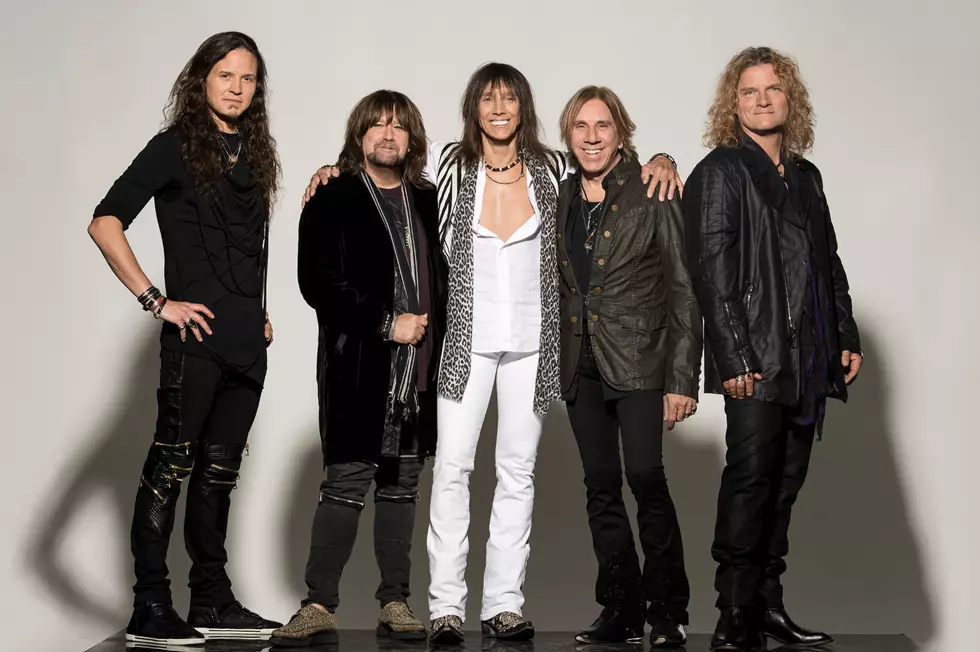
How Tesla Disputed Glam Metal Tag With ‘Great Radio Controversy’
Tesla made nary a ripple in the waters of a burgeoning mid-'80s rock scene with their late-1986 debut LP Mechanical Resonance. This blue-collar Sacramento five-piece eschewed the teased hair to the rafters, spandex and heavy makeup in favor of nondescript mullets, denim and t-shirts and mugs you might see on any local construction site.
Then came the Feb. 1, 1989 release of their sophomore effort, The Great Radio Controversy, and no longer were Tesla an afterthought to help fill the second hour of MTV’s Headbangers Ball.
“Heaven’s Trail (No Way Out),” the lead single, is a dark and menacing burner guided by Frank Hannon’s slide guitar, while the album-opening “Hang Tough” rumbles with confidence. The record as a whole is much of the same, whether it’s when aping Physical Graffiti-era Led Zeppelin on “Be a Man” or pushing limits with the furiously paced “Yesterdaze Gone.” More importantly, it’s a tighter and more polished work than Tesla's debut.
A blues tint radiates across the 13 tracks on The Great Radio Controversy, another thing which separated Tesla from the pack, as did the (for the most part) mature themes to the compositions. Then there's the twin-guitar attack from Hannon and Tommy Skeoch. Hannon was the flashy player and natural rock star of the pair, while Skeoch handled the acoustics, slide and more exploratory elements of the instrument.
“Makin’ Magic” and “Did It for the Money” may have been lyrically questionable numbers, but the musicality and tightness within the band managed to keep the proceedings appealing. Even the title of the LP was the road less traveled: It offered a deeper meaning regarding Nikola Tesla, at a time when the band’s namesake was way off the radar of the general populace. Like this musical quintet, he seemed like an entity in the wrong time period. The Great Radio Controversy was a nod to the inventor’s battle to be recognized as the rightful creator of radio, rather than the generally agreed-upon Guglielmo Marconi.
Despite all of that, Tesla couldn’t surmount the glam metal tag that followed their first real taste of mainstream success with the single “Love Song.” The delicate, close to a minute-and-a-half acoustic prelude by Hannon was an anomaly, but that big, made-for-arenas sing-a-long chorus and searing guitar solo sounded a lot like all the other tunes that made girls weak in the knees.
Watch Tesla Perform 'Love Song'
For Tesla, the success of “Love Song” – it peaked at No. 10 on the singles chart – was a double-edged sword. On one hand, it catapulted them into the conversation of best power-ballad of the day next to Poison’s “Something to Believe In” and Warrant’s “Heaven.” But as a whole it relegated them, in many a casual fan’s mind, to nothing more than an eventual deep cut on a mid-aughts Monster Ballad compilation. They were thought of as a hair metal one-hit wonder, along the lines of Kix and Steelheart, even though Tesla actually charted higher two years later with a cover of the Five Man Electrical Band’s “Signs.”
According to singer Jeff Keith, the popularity of “Love Song,” despite being buried deep on the second side of The Great Radio Controversy, was most surprising to the record label.
“You know, that song, Geffen Records when they heard the demos said it is three great ideas. 'Put it in a song format, you know, in a different arrangement,'" Keith recalled years later. “And we said, ‘Well, we like that arrangement and that is the way we are passionate about it,’ and they said, ‘If you do not rearrange it and make it into a proper song then we are not going to use it,’ so we said ‘Don’t use it.’ Because that is how we feel the song should be and we stuck by our hearts and they said ‘Well, okay you are going to be sorry,’ and it ended up being our only Top 10 single we have written. … At any rate, the song is in the form that it is and one of the band’s favorite songs. It is one of my favorite songs because it is about love, and Tesla is very much about love.”
"Love Song" remains the song most closely associated with Tesla, and that’s not a complete negative. They were really good at the whole light/heavy thing. Elsewhere on The Great Radio Controversy, Tesla had similar success with "The Way It Is" and "Paradise." In fact, the latter might be the most ambitious track on this album, given its tempo changes and progression from beginning to end.
If "Love Song" is still what draws listeners in, then moments like "Paradise" are what completes the story of Tesla – the glam-rock band that really wasn't.
Ranking Every Tesla Album
More From 103.7 The Loon







![Def Leppard @ Xcel Energy Center [PICS]](http://townsquare.media/site/295/files/2015/07/Def-Leppard-Yeah-2006.jpg?w=980&q=75)


